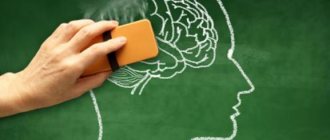A good memory is a gift from birth, and a phenomenal one is the result of training! Do you forget why you went to the refrigerator, have difficulty remembering phone numbers and are constantly late for meetings because you don’t remember them at all? Don’t worry, memory is not only possible, but also necessary to be developed! After all, the one who owns the information owns the world. And for this, your brain must work as productively as possible. In this article, you will learn simple techniques that will help “awaken” your memory. Of course, we don’t promise to remember complex digital combinations, but it’s quite possible to improve your memory!
There are several classifications and types of memory. Let's highlight three popular criteria.
What is memory and why does it deteriorate?
Memory is a mental process that occurs in the brain and is aimed at perceiving, processing, storing and, if necessary, reproducing previously acquired information.
In addition to accumulation, our brain has the amazing property of erasing. This function protects the nervous system from overstrain. This is how memory gets rid of outdated or destructive information that can bring us unwanted emotions and experiences.
But not only unnecessary, but also important information is often forgotten. Scientists have found that after 30–40 years, brain volume decreases by about 2% every decade. The connection between neurons gradually weakens. It becomes more difficult to learn and absorb new information.
It’s not just age that causes deterioration in brain activity. There are other pests:
- lack of sleep;
- excess sugar in the diet;
- excess weight;
- nicotine and alcohol;
- vitamin D deficiency;
- passive lifestyle;
- non-compliance with the dosage of medications or uncontrolled taking of pills;
- information overload;
- traumatic brain injuries;
- frequent stress;
- brain diseases.
Get enough sleep
Lack of sleep over a long period of time is directly linked to poor memory. It is during the night's rest that short-term memories are converted into long-term ones.
Researchers studied Sleep Improves Memory: The Effect of Sleep on Long Term Memory in Early Adolescence. the effects of sleep on 40 children aged 10 to 14 years. One group was prepared for memory tests in the evening, but was interviewed in the morning. Another group was trained and tested on the same day. Children who managed to sleep showed 20% better results.
Another experiment established Sleep Improves Memory: The Effect of Sleep on Long Term Memory in Early Adolescence. that nurses working the night shift made more mistakes on math tasks and performed worse on memory tests than their colleagues on the day shift. Therefore, it is recommended to sleep 7-9 hours every night.
Exercises to improve brain activity
You can and should train your memory at any age. Even after 50, 60, 70 years, you can easily remember information if you constantly develop your brain.
More than 100 cool lessons, tests and exercises for brain development
Start developing
Exercise “Cellular Toking”
This is a very simple and at the same time effective exercise that will help increase the speed of thinking and make the brain neurons work at full capacity.
The point is this. You need to quickly name the objects located in the room: table, TV, chandelier, curtains, pencil, mobile phone, closet, etc. You can simply list the names, or you can describe them along with their properties. For example, a red lamp, an inconspicuous wooden box, beige checkered linoleum, etc.
Soon you will see that the pauses between words are becoming longer and longer, gestures are used, you begin to stammer and get confused. Rest assured, over time you will last longer. It will turn out better and better.
Exercise “Words in reverse”
This method will help combine the development of memory and attention. Make up words and pronounce them backwards. For example, “shop - nizagam”, “captain - natipak”, etc.
It is important not to write down and read from a piece of paper, but to imagine the words in your mind. To begin with, you can take simple words (nose, fox, whale, tom), and then move on to more complex ones.
To make it easier, divide long words into syllables, and only then mentally turn them around:
- picture: “kar-ti-na” – “an-it-rak”;
- column: “ko-lon-ka” – “ak-nol-ok”.
Exercise “Memory Warehouse”
Very good workout. You need to name the names of all the poets or writers you know.
Here you can experiment as you please. Instead of names, you can list, for example, animals of the savannah, plants, cities, rivers, books you have read, places you have visited, former classmates, your child’s lesson schedule, etc.
Exercise with cards
You will need a deck of playing cards. Mix them and draw a sequence of 6 cards (the number can be gradually increased). Look at them carefully for 30 seconds and then turn them face down. Try to remember all the cards in the order in which they lay in front of you.
I'm sure you'll be interested in learning how you can learn to remember information better. Especially for you, we have selected effective mnemonics and recommendations from psychologists for quick memorization.
Exercise “How was your day”
It is useful to do it before bed. When you are lying in bed, try to remember all the details of the past day: where you were, who you talked to and about what, what clothes your colleague wore to work, who called you on your mobile and at what time, what music was playing in the minibus, on what did you notice in the grocery store, etc.
Important! Such training should be like sorting through beads in a rosary: the first event, then the second, and then the third. This is purely a process of remembering. If you start working on mistakes and involving emotional evaluation, the memory training exercise will turn into a ritual of regret and instead of benefit, you risk getting insomnia.
And if you need to remember any material, it is best to use the Feynman method.
Facilities
If intellectual puzzles and logical problems do not help, then a specialist should deal with it.
Medications
If there are serious problems with memory and the doctor has diagnosed this, he may suggest solving them with pills. There are a number of drugs that improve cerebral circulation and promote the development of thinking and memory. The most famous: Noopept, Nootropil, Glycine, Phenibut, Piracetam, Tenoten and other nootropics, adaptogens, antioxidants, antidepressants.
Sometimes they can prescribe individual vitamins that help improve and develop memory: C, D, E, almost the entire group B. They are also collected in multivitamin complexes designed specifically for the brain.
Adults can take a course of dietary supplements, but no one can guarantee their effectiveness. Although good drugs for the development of cognitive processes are produced by Doppelherz (Germany), Evalar (Russia), Solgar (USA).
Folk remedies
The same goes for folk remedies. They don't develop memory. But by activating cerebral circulation, normalizing blood pressure and improving overall well-being, they help adults begin to remember and reproduce much larger volumes of information faster and better (without errors ) . Infusions and decoctions of meadow clover flowers, motherwort leaves, wormwood, elecampane roots, red rowan bark, and rose hips have such properties.
However, you should be extremely careful with folk remedies, since in the presence of chronic diseases they can cause their exacerbation or side effects.
Discreet workout in everyday life
In this section, I have collected for you the simplest, but no less effective recommendations that you can easily implement at home, as they say, against the background:
- Work more often with your left hand (if you are left-handed, then with your right). Brush your teeth, wash the dishes, write notes, button up your buttons, hold your cutlery, clean the bathroom, etc. This will help your less active right brain become better, and as a bonus, develop your creativity and lateral thinking.
- Practicing with your eyes closed will help develop sensory skills. Walk around the apartment, take a shower, touch objects, but don’t look at them. This exercise can be performed even on public transport: go through the coins in your pocket and try to determine their value.
- To test your brain function, make a grocery list before going to the store, but keep it in your pocket, and add the purchases to your cart from memory. At home, you can check whether the contents of the packages correspond to the original plan.
- Everything familiar tires and depresses the brain. Try to make even the smallest changes in your life. Rearrange the furniture or move things from their usual places, cook a new dish with an unusual taste, walk around the house in different shoes (put on slippers on your right foot and high-heeled shoes on your left). It is also very useful to periodically change your usual routes. For example, take a different route to the nearest store or take the stairs instead of the elevator.
- To train your memory and speech, try to come up with as many different answers as possible to the question of how you are doing. Then, when necessary, be sure to remember and use original answers in communication.
Remember what happened to you during the day
Before going to bed, at the end of the day, scroll through all its details in your head. What did you do throughout the day, what would you do to improve some aspects. Think back about your day. From now until awakening. Believe me, this is not an easy task! Ask the question: “What was the most effective decision I made today?”
Memory Strengthening Products
Diet can help your brain function properly. The most useful foods for memory are those enriched with vitamins A, B6, B9, B12, D, E, Omega-3.
Experts recommend eating more fruits, fresh vegetables and whole grain flour products. It is also useful to add turmeric to food, because this spice helps maintain memory and prevent Alzheimer's disease, which is especially important for an elderly person.
Here are the top 10 most useful foods for improving memory:
- Sea fish. It is one of the best sources of Omega-3 fatty acids. Regular consumption of tuna, salmon and other fatty sea fish will help maintain mental clarity into old age.
- Eggs. Easily digestible and essential protein for brain function. In addition, egg yolk contains choline, which is very beneficial for memory.
- Nuts and whole grains. All nuts contain vitamin E, which protects brain cells from destruction. And whole grains are an excellent source of carbohydrates and B vitamins.
- Oatmeal. Oatmeal is healthy for both children and adults. It not only improves brain function, but also has a beneficial effect on the entire body.
- Berries. Blueberries, strawberries, blackberries and currants are especially useful. Darker colored berries have more nutrients.
- Beans . These are sources of valuable minerals, fiber, complex carbohydrates and large amounts of protein.
- Fish fat. It is prized for its unique ratio of omega-3 fatty acids. Researchers have found that if you regularly drink fish oil, you can significantly improve your memory.
- Dairy food. It brings particular benefits to children due to the content of protein and B vitamins. But vitamin D, which dairy products are also rich in, is vital for people of any age. Scientists have found that a drop in the level of this vitamin below 20 nanograms per 1 ml of blood leads to more rapid memory deterioration.
- Meat. Beef, lamb and other red meats are rich in iron and zinc. These elements keep your memory in good shape. Poultry meat without skin is also useful.
- Foods rich in the right fats. Our entire nervous system and brain are 80% fat. Sources of good fats are young cheese, avocado, olives, melted butter, and egg yolk.
Here are the foods that can harm brain health and memory:
- alcohol;
- sugar;
- refined carbohydrates - noodles, rice, fast food, sugary cereals.
When talking about proper nutrition, one cannot fail to mention excess weight. Researchers have found that obesity has a detrimental effect on memory and overall health.
Watch your weight
Obesity is a risk factor for cognitive decline. Excess weight can cause Obesity Weighs down Memory through a Mechanism Involving the Neuroepigenetic Dysregulation of Sirt1. changes in memory-related genes in the brain, negatively affecting memory.
As part of the experiment, scientists observed Higher body mass index is associated with episodic memory deficits in young adults. followed a group of people aged 18 to 35 and found that a higher body mass index was associated with poor performance on memory tests. Obesity also results from 37 years of body mass index and dementia: observations from the prospective population study of women in Gothenburg, Sweden. to a higher risk of developing Alzheimer's disease.
What else can help keep your brain young?
We have learned the exercises and taken note of useful products, and now we will move on to studying additional methods and recommendations that will help you improve your memory and preserve it for many years.
Get enough sleep
Experts in the field of sleep research have long established its direct relationship with memory. Our brain is designed in such a way that in order to remember new information, it needs to go through a certain phase of sleep.
You've probably noticed that a verse memorized for a school lesson is best remembered the next morning. Yesterday you tried to remember it, and at night in your sleep your brain got the opportunity to process and sort new data.
By the way, I recommend reading the article on how to get enough sleep. Advice from psychologists will help you properly organize your sleep.
Train your brain
There are many ways to train memory and brain activity:
- memorizing poems, phone numbers;
- learning foreign languages;
- collecting puzzles;
- needlework;
- solving crosswords, scanwords and sudoku;
- playing chess, checkers, etc.
You can download various puzzle apps to your smartphone and practice on the bus on the way to work or in line at the supermarket.
If you want to learn more about how to train your brain, I recommend taking a look at our publication. The blog also has a selection of the best online trainers for brain development.
Stay physically active
American research has helped establish that during movement, new cells in a region of the brain called the hippocampus grow. It is responsible for filtering incoming data and sorting what needs to be sent to long-term memory and what needs to be recorded in short-term memory. Thanks to motor activity, not only new cells grow, but also old ones are protected from destruction.
Just imagine: a light half-hour jog or workout can increase mental abilities and concentration by 2-3 times, and facilitate the process of memorization.
Practice mindfulness
Being here and now is very difficult. Most often, we are in our thoughts: we chew on unpleasant situations, conduct internal dialogues, plan future events, and worry about them. Being in our head, we perform habitual actions on autopilot, and then we cannot remember the details. We put the glasses in the wrong place, closed the front door and forgot, we can’t remember if the iron was turned off.
Mindfulness will help improve concentration and memory. Return from your head to your body, perform all actions, being aware of them, feel how you come into contact with objects, listen to sounds.
Meditation will help improve your short-term memory. Those who regularly engage in meditative practices have significantly better memory.
The blog iklife.ru has a selection of the best courses on meditation. Take a look - it will be interesting!
Peculiarities
According to psychology, memory is a dynamic neuropsychological system that can be improved or destroyed. Its development can go in two directions:
- Phylogenetic, natural development in accordance with age as life experience accumulates under the influence of everyday factors.
- Ontogenetic, artificial development in each individual person, pre-organized and thought out, carried out through various experiments.
In psychology, the following developmental features in phylogenesis are distinguished:
- invention and improvement of mnemonics;
- creating and improving methods for recording, storing and reproducing information;
- exchange of information, exchange of experiences between generations and countries in order to develop collective memory;
- language learning;
- creation of didactics and educational methods;
- transition from mechanical memory to semantic memory, from direct to indirect, from involuntary to conscious.
As for ontogenesis, here each individual individual independently thinks about how he will develop his abilities. Psychologists identify several directions in this issue that can be followed:
- complete control over one’s own mental functions (including mnemonic abilities), volitional regulation of them;
- transition from external methods of their development to internal ones;
- inclusion of intelligence in the processes of recording, storing and reproducing information;
- purposeful mastery of mnemonics.
V. Ya. Lyaudis (Doctor of Psychological Sciences) identified 4 levels of memory development in ontogenesis:
- The lowest level is immediate, involuntary.
- Level I - externally mediated, arbitrary.
- Level II - internally mediated, voluntary.
- The highest level is phenomenal.
You can study in more detail the question of how memory develops in phylogenesis and ontogenesis by reading the works of psychologists such as A. N. Leontiev, P. I. Zinchenko, P. P. Blonsky, Z. M. Istomina, A. A. Smirnov , L. S. Vygotsky.
How to develop memory and attention in a child
Cognitive functions in adulthood largely depend on how developed and trained a person’s brain is in childhood. For the proper development of a child’s memory, experts recommend the following:
- Choose educational and intellectual games that will be interesting to your baby. Nowadays, children's stores do not have a shortage of assortment, so finding suitable development toys will not be difficult.
- Avoid multitasking. The child must learn to focus on one object. Make sure that the study of the poem is not combined with listening to TV in the background.
- Practice visualization. You can voice a fictitious situation to your child so that he describes its details. For example, say: “A cyclist is riding along a forest road.” Let the child imagine and tell what color the bike is, what the person sees along the way, what he is wearing, how wide the road is, etc. You can also ask him to draw this situation.
- Invite your child to tell in detail various events from his life: how his day at school went, what the story he read was about, what rules should be used to play his game on the computer, etc.
- Make sure your child's sleep is complete and healthy. Don't let yourself fall asleep watching TV or your phone, because the blue light from the screen makes sleep shallow and restless, which doesn't allow your brain to rest properly.
- Another couple of important components for brain health are physical activity and good nutrition. Correct intake of vitamins and walks in the fresh air contribute to the development of attention and facilitate the assimilation of new information.
Techniques
It is important for adults to choose the right method for memory development. If there are specific programs for children (most often gaming), then after school a person is left alone with his problems. Some people prefer to ignore them: they forgot about an appointment - who doesn’t! Some people are hesitant to see a psychotherapist or neurobiologist: it’s embarrassing to admit that you can’t remember your own phone number. Others try to follow in the footsteps of childhood memories and play online simulators for preschoolers and teenagers, since they themselves cannot find anything more worthwhile.
All three situations turn out to be failures. As a result, memory will invariably deteriorate and every year more and more. Therefore, all adults need to know what methods for its development have been created for people who are already over... And in fact there are not so few of them:
- mnemonics;
- neurobics;
- finger gymnastics;
- speech exercises;
- speed reading;
- online simulators;
- test and game tasks;
- ordinary memory development exercises;
- mobile applications.
In addition to these effective techniques, you can use the miracle remedies of traditional medicine and innovative modern technologies. Dietary supplements, vitamin complexes, tablets that improve brain function and strengthen cognitive mental processes, coupled with the above methods, will allow you to remember and reproduce gigabytes of useful information. And, of course, do not forget that all this will have no effect if you do not normalize your lifestyle and monitor your health.
Useful books for memory training
Below you will find popular publications for adults and children on improving memory:
- Idriz Zogay “Minne, or Memory in Swedish. Methodology of the famous trainer for memory development” (LitRes);
- Ryuta Kawashima “Train your memory. Japanese system for preserving brain health” (LitRes);
- Ryuta Kawashima “Train your brain. Japanese system for the development of intelligence and memory. Advanced version” (Labyrinth);
- Anton Moguchiy “Brain trainer. Methods of intelligence agents - development of intelligence, memory and attention” (Labyrinth);
- Jonathan Hancock “How to train your memory. Don’t think about memory - better use it to the fullest!” (LitRes);
- Arthur Dumchev “Remember everything. Practical Guide to Memory Development” (LitRes);
- Wenger Wien, Poe Richard “The Einstein Factor, or How to Develop Phenomenal Memory and Reading Speed” (Labyrinth);
- Anastasia Kruglova “Training memory, attention, logical thinking. For children from 4 to 7 years old” (Labyrinth);
- Shamil Akhmadullin “Book on how to train memory in children 7–10 years old” (Labyrinth).
You can read more about the contents of these and many other books on ways to improve memory on our blog. I also recommend taking interesting trainings and courses on developing memory and attention.
Train your mindfulness
Mindfulness is a mental state in which you focus on a situation while being aware of your feelings and your environment. It is used as part of meditation, but is not equal to it, since it is not a formal practice, but a habit.
Research confirms that mindfulness is effective in reducing stress and improving concentration and memory. An experiment with psychology students showed Mindfulness Enhances Episodic Memory Performance: Evidence from a Multimethod Investigation. that those trained in this technique improved their object recognition speed.
Mindfulness helps reduce Mindfulness Training for Healthy Aging: Impact on Attention, Well-Being, and Inflammation. risk of age-related cognitive decline and generally has a positive effect on psychological well-being.
Read aloud
Research shows that reading material out loud makes it easier to remember information. Teachers also support this concept and put it into practice when asking their students to teach new material to their classmates. You can also use this approach and learn new material with your friend.
Exercise
Physical exercise is known to improve cognitive abilities, concentration, blood circulation in the brain by increasing the flow of oxygen to brain cells, and mood.
Exercise also causes the release of the protein cathepsin B in the brain. This stimulates the growth of neurons (brain cells) and creates additional connections in the hippocampus, an area of the brain responsible for long-term memory and retention.
The effectiveness of exercise in improving brain function has been proven in a number of studies, so let's talk about that first. One study showed that just a few minutes of light exercise resulted in immediate memory improvements. Participants in the experiment performed exercises of varying intensity, and at this moment the scientists observed changes in brain activity.
The results showed that during these exercises, connectivity improved between the areas of the brain responsible for creating new episodic memories (autobiographical memory, which remembers “who, what, where and when”), as well as in the dentate gyrus and hippocampus.
Therefore, with just a few minutes or even an hour of exercise, you can improve your memory. You can try a treadmill or walking to start with, and most people can do it.
Drink less alcohol
Alcohol has devastating effects on many aspects of health. Memory is no exception. Scientists have studied Binge drinking during adolescence and young adulthood is associated with deficits in verbal episodic memory. 155 college freshmen. Those who drank heavily performed worse on memory tests than students who never drank. Due to the neurotoxic effects of alcohol on the brain, heavy drinking can damage Hippocampus in health and disease: An overview. The hippocampus is the most important part of the brain for memory.
However, scientists believe that negative consequences can be easily avoided if you drink in moderation.
Analyze the material in detail and repeat what you have learned
To remember information, you must first make it understandable to the brain, and then repeat everything you learned again, then the information will definitely fall into long-term memory. For example, read the definition of a key term, study the definition of that term, and then read a more detailed description of what that term means. By repeating this process several times, you will probably notice that you recall the term more easily and quickly over time.
To repeat the studied material, it is also recommended to divide it into three difficulty categories. For each, select the amount of time you will spend and the days per week.
Review the material again, if you remember it well, then repeat it only once a week.
If you have difficulty reproducing information, then re-read it after a few hours or every other day.
And if you don't remember anything, then study the material again for 10 minutes. After everything, the cycle repeats, you again sort the information according to how you remembered it and allocate your time to repetition and filling in gaps.
Spend more time on complex information
Which information is remembered most easily at the beginning or at the end? Researchers have found that the order in which data is examined plays a significant role in how quickly the brain samples and produces that information. And the material is remembered best at the beginning of the book and at the end.
Information is often lost in the middle, but this problem can be solved by repeating it several times. Another strategy is to try to rephrase what you've learned in your own words to make it easier to remember.
Factors influencing memory development
Memorization efficiency is affected by age and health status. Over time, memory deteriorates. After 30 years, you need to make more efforts to maintain memory functions and intelligence in old age.
Elderly woman reading
Important! Stress, overwork, and anxiety negatively affect the emotional state and affect the ability to quickly remember information. Some medications, alcohol, and caffeine in uncontrolled quantities impair memory.
Information is better absorbed if:
- It arouses interest, the process of learning is easy, with pleasure;
- Associated with bright positive emotions and impressions;
- Used in practice;
- Understandable, presented in easily accessible language;
- Often meets.
The information provided must be logically structured; this is what will allow it to be analyzed and captured for a long time. A person can resort to rote memorization when data remains in memory in the form in which it was presented and is memorized. Such information will not remain at a person’s disposal for long. You need to think about what you hear, be able to highlight the main idea, trace the connection and logic. Then the main points that convey the essence of the story will be stored in memory.
Eat less refined carbohydrates
Research shows that diets high in refined carbohydrates are linked to Why is obesity such a problem in the 21st century? The intersection of palatable food, cues and reward pathways, stress, and cognition. with dementia and cognitive decline.
Scientists examined 317 children and identified Relationships between Dietary Intake and Cognitive Function in Healthy Korean Children and Adolescents. decreased cognitive performance in those who ate more processed carbohydrates, such as white rice, noodles and fast food. Another study showed a Prospective Study of Ready-to-Eat Breakfast Cereal Consumption and Cognitive Decline among Elderly Men and Women. that adults who eat sugary cereals for breakfast every day perform worse on tests.











